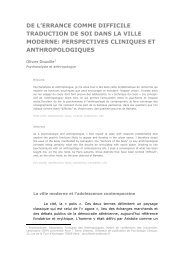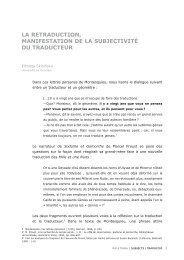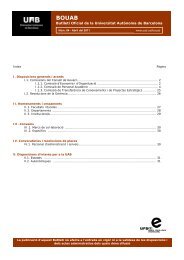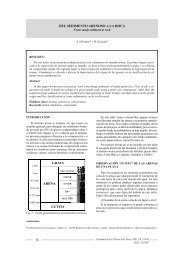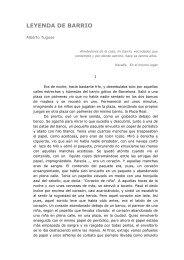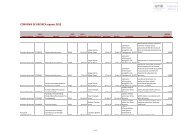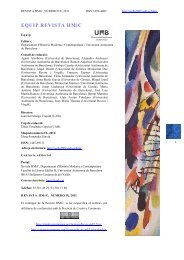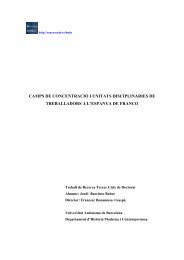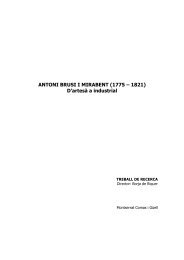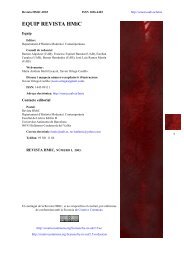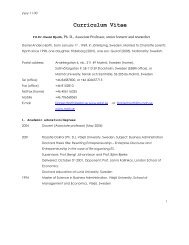EQUIP REVISTA HMiC - Universitat Autònoma de Barcelona
EQUIP REVISTA HMiC - Universitat Autònoma de Barcelona
EQUIP REVISTA HMiC - Universitat Autònoma de Barcelona
You also want an ePaper? Increase the reach of your titles
YUMPU automatically turns print PDFs into web optimized ePapers that Google loves.
The mo<strong>de</strong>rnisation of China and the Chinese critique of mo<strong>de</strong>rnity<br />
In 1601 two European Jesuits reached Beijing, the capital of the Chinese empire, to establish<br />
a mission. The presence of the Jesuits in China opened the door to an unprece<strong>de</strong>nted cultural<br />
exchange that would be very significant for both China and Europe (Gol<strong>de</strong>n 2000). Over a<br />
period of one and a half centuries, the Jesuits translated the canonical works of Confucianism<br />
into Latin and their publications influenced intellectual <strong>de</strong>bates and discourse in Europe. They<br />
also maintained correspon<strong>de</strong>nce with leading European intellectuals such as Leibniz and<br />
Voltaire. On a number of occasions Montesquieu interviewed Arcadio Huang, a Chinese man<br />
who had arrived in Paris to study for the priesthood, but <strong>de</strong>ci<strong>de</strong>d to marry instead, and became<br />
the librarian of the French king’s Asian collection.<br />
These interviews influenced L'Esprit <strong>de</strong>s lois. Voltaire was inspired by the <strong>de</strong>scriptions he<br />
received from Jesuits in Beijing of the Chinese political system and the imperial examinations<br />
<strong>de</strong>signed to select “Mandarins” on the basis of their own merits as <strong>de</strong>monstrated through public<br />
examinations to invent the mo<strong>de</strong>rn concept of the civil service. Jesuit <strong>de</strong>scriptions of the<br />
Chinese Kangxi emperor, who took active part in controversial <strong>de</strong>bates about Christian doctrine<br />
and Confucian practices inspired the Enlightenment i<strong>de</strong>a of the enlightened <strong>de</strong>spot. The Art of<br />
War by Sunzi was translated into French in the 1780’s by Joseph-Marie Amiot S.J. and quickly<br />
went through five editions, one of which quite probably reached the hands of the young officer<br />
Napoleon Buonaparte.<br />
During this period, which came to an end with the suppression of the Jesuits in the middle of<br />
the 18 th century, China’s image in Europe was totally positive. It was the period of chinoiserie.<br />
Once the bridge of cross-cultural transfer that the Jesuits had established was cut off, different<br />
actors came to the fore, such as the East India Company, which would conquer India and force<br />
the traffic of drugs on China with the support of the British and French governments, through<br />
war.<br />
One extremely important consequence of this change of affairs was its effect on the discourse<br />
applied to China in Europe and on the very image of China. Far from being the great mo<strong>de</strong>l that<br />
had inspired Enlightenment thinkers like Voltaire, a new metaphor was applied to China: “the<br />
sick man of Asia”. The major thinkers of the later Enlightenment period, such as Hegel —whose<br />
i<strong>de</strong>a of History formed the basis for Fukuyama’s (in)famous <strong>de</strong>claration of the end of history in<br />
1989— or Kant or Marx portrayed China as a completely negative mo<strong>de</strong>l, without History<br />
(Hegel), without Reason (Kant), with antiquated and fossilised mo<strong>de</strong>s of production (Marx). A<br />
new process of the social construction of reality had begun that World justify military<br />
aggression and partial colonialisation throughout the 19 th century and the first half of the 20 th<br />
century by the European imperialist powers, as well as the USA and Japan.<br />
During the transitory period between chinoiserie and “the sick man of Asia” still another<br />
Enlightenment thinker, François Quesnay (1694-1774), lea<strong>de</strong>r of the Physiocrats, came to be<br />
known as the European Confucius. His text Despotisme <strong>de</strong> la Chine (1767) proposed<br />
reorganising the French economy on an agricultural basis as China did. He saw the exercise of<br />
power by Mandarins in China as a living example of Plato’s Republic, and his admiration for<br />
what he perceived to be a minimalist approach to government intervention in the Chinese<br />
economy inspired the Physiocratic concept of laissez-faire.<br />
Both enlightened <strong>de</strong>spotism and the civil service, on the one hand, and the laissez-faire<br />
concept of the free market, on the other, are constituent elements of the heritage of the<br />
Enlightenment that gave rise to mo<strong>de</strong>rnity that had their origins in a traditional Chinese mo<strong>de</strong>l.<br />
Les Droits <strong>de</strong> l'Homme and laissez-faire are equally part of the inheritance of the Enlightenment<br />
http://seneca.uab.es/hmic Revista <strong>HMiC</strong>, número IV, 2006<br />
12



